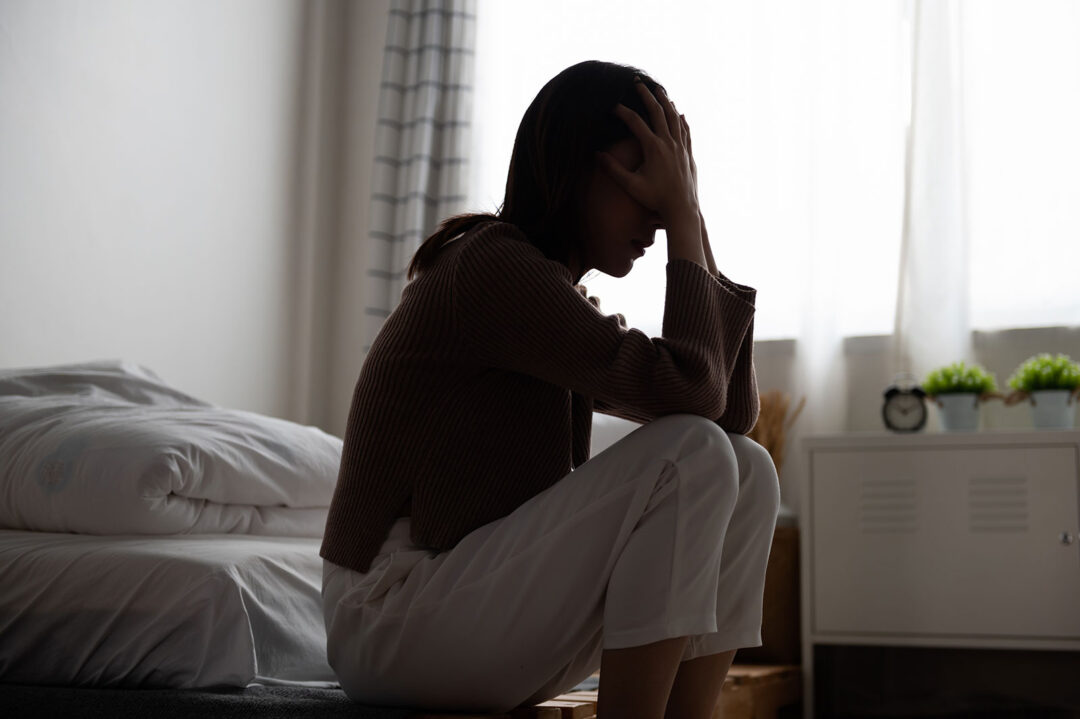CBD & PTSD—What We Know

Experiencing trauma is not rare. About six out of every ten men and five out of every ten women in the US experience at least one traumatic event in their lives. A lasting result of traumatic events sometimes takes the form of post-traumatic stress disorder, a psychiatric disorder that persists well after the event.
Given the growing interest in CBD’s therapeutic uses, PTSD has become one of the critical topics of focus. Below we describe:
- What full-spectrum CBD oil is
- What PTSD is and what the common symptoms are
- How CBD may positively affect PTSD and traumatic brain injury
What Is CBD?
Cannabidiol, or CBD, is the most abundant compound in hemp plants and is found primarily in the flowers and leaves of the plant. It’s one of more than 100 cannabinoids that can be extracted from the plant and is used to make a wide variety of products, such as CBD oil, lotions and creams, edibles, and capsules.
CBD has grown in popularity as people discover its therapeutic benefits, especially as a natural anti-inflammatory.
What Is Full-Spectrum CBD Oil?
Full-spectrum CBD oil means the product contains many cannabinoids beyond CBD, such as CBN, CBDV, THCV, CBG, CBC, THCA, and CBDA. Full-spectrum CBD oil also contains other compounds from the hemp plant, including naturally-occurring terpenes, essential vitamins, fatty acids, proteins, and more.
The alternative to full-spectrum CBD is CBD isolate. In isolates, the CBD molecule is chemically isolated from all other compounds in the hemp plant, resulting in a powder substance mixed with a carrier. CBD isolates have no identifiable amount of THC and are stripped of other beneficial and nutritional compounds, such as terpenes, flavonoids, vitamins, and protein mentioned above.
What Is Post-Traumatic Stress Disorder (PTSD)?
Post-traumatic stress disorder (PTSD) can occur in people who have experienced a traumatic event, such as a natural disaster, a terrorist act, rape or other violent personal assault, and war or combat.
Individuals with PTSD experience intense thoughts and feelings related to their experience that last long after the event has ended.
They may relive the event through flashbacks or nightmares. They may feel periods of unexplained sadness, fear, or anger and may feel detached from others. People with PTSD may avoid situations or people that remind them of the traumatic event, and they may have strong adverse reactions to something as ordinary as a loud noise or an accidental touch.
About 7-8% of Americans experience PTSD at some point in their lives, and roughly 8 million Americans live with PTSD in any given year.
Post-traumatic stress disorder is a more common condition among veterans than among other members of society, with some experts estimating that up to 30% of military veterans may experience PTSD.
Common Symptoms of PTSD
Symptoms of PTSD tend to fall into four broad categories.
- Intrusive Thoughts: repeated, involuntary memories, disturbing dreams, or flashbacks of the traumatic event.
- Avoiding Reminders: avoiding people, places, activities, objects, and situations that bring on event memories.
- Negative Thoughts and Feelings: ongoing and distorted beliefs about oneself or others (e.g., “No one can be trusted”). ongoing fear, horror, anger, guilt, or shame; much less interest in activities previously enjoyed; or feeling detached or estranged from others.
- Reactive Symptoms: may include irritable and angry outbursts, behaving in self-destructive ways, or having problems concentrating.
How Can CBD Help With PTSD?
PTSD is usually addressed pharmacologically with anticonvulsants and with what are known as atypical antipsychotics, but many patients do not respond to these drugs. Many others experience adverse side effects that limit their ability to use the medications at sufficient doses or over long periods of time.
Perhaps because of the lack of effective therapies, patients with PTSD are more likely to use cannabis than those who do not have PTSD. Research has shown that the more severe the symptoms of PTSD, the more motivated individuals are to use cannabis for coping.
Cannabis has been reported to improve PTSD symptoms such as:
- Anxiety
- Insomnia
- Nightmares
The therapeutic properties that have been observed for CBD are widespread and involve, for instance, neuroprotective, analgesic, antipsychotic, anticonvulsant, and antioxidant effects.
The specific way CBD may achieve its benefits for those who have PTSD may therefore take a long time to delineate, but scientists have started to paint a picture of how the process may work.
Through its effects on the endocannabinoid system, CBD has been shown to help destroy bad memories and help block reconsolidation, which is a process that is required for cementing them into long-term memory.
A potential benefit of CBD over other agents that target the endocannabinoid system is that CBD does not tend to cause anxiety, whereas other agents typically used to treat PTSD can increase or decrease anxiety depending on their dosage.
This effect of other agents can complicate treatment regimens.
CBD’s Impact on Memory
Typically, when a memory trace is activated, it undergoes processes in the brain that determine whether the memory will become more strongly remembered or more easily forgotten. In the case of aversive memories like those involved in PTSD, the goal of therapy is often to weaken the memory and its psychological power over the patient. Luckily, the processes involved in the evolution of memory can be influenced pharmacologically, and CBD appears to be a promising candidate for helping to disrupt the instantiation of bad memories linked to PTSD.
Not only has CBD been shown to disrupt bad memories themselves, but it has also been shown to reduce some of the associated physiological signs of stress that are hallmarks of PTSD, such as those related to the cardiovascular system.
These positive effects of PTSD on anxiety symptoms may occur through CBD’s action on serotonin receptors in the brain. Indeed, serotonin is a chemical that is well known to be involved in anxiety processes.
How Can CBD Help With Traumatic Brain Injuries?
On the topic of military veterans, those who serve in combat are at an increased risk for traumatic brain injury (TBI). TBI is destructive to the brain and is associated with various conditions, including psychiatric disorders and dementia.
Unfortunately, traumatic brain injury does not have a cure, and most available interventions are not highly effective in overcoming symptoms of TBI or in combating the underlying brain processes that occur following TBI.
Though the initial insult can be damaging, the body’s response to TBI tends to be more destructive as the immune system attempts to recover.
During this time, immune system cells rush to the site of injury, causing inflammation that can suffocate and kill the surrounding tissue. Many of the symptoms associated with TBI result from this inflammatory process rather than the initial blow to the head.
The Endocannabinoid System and Traumatic Brain Injury
The modulation of the endocannabinoid system, which can be achieved with CBD, is thought to be potentially protective in the case of TBI. Specifically, by influencing the endocannabinoid system, we may be able to halt some of the inflammation and cell death that occurs in the brain following TBI. There is evidence that CBD has both physiological and behavioral effects. Indeed, learning and memory deficits, motor impairments, and seizures may be alleviated by CBD.
Interestingly, TBI patients have been shown to have lower mortality rates when their urine contains THC – a significant component of cannabis. Preclinical research has shown that even extremely low doses of THC can protect the brain from cognitive deficits associated with TBI.
CBD’s Neuroprotective Qualities
CBD has also been implicated as a potential neuroprotective cannabinoid for patients with TBI. The anti-inflammatory properties of CBD have made it a promising candidate for therapies for other conditions and diseases and may explain how it could help TBI patients.
While the anti-inflammatory influence of CBD has not yet been investigated in TBI patients, CBD has been shown to reduce the expression of FosB, a gene product that has been found at higher levels in TBI patients.
How To Use CBD Oil for PTSD
We recommend starting with a full spectrum CBD extract (CBD oil) taken sublingually once to twice daily. Sublingually means placing the oil under your tongue using the dropper and holding it there for 60-90 seconds or until the oil has been absorbed. CBD extracts tend to have the highest bioavailability among CBD products, meaning they are absorbed into your bloodstream at a higher percentage than CBD foods or beverages.
How Much CBD Oil Should I Take?
Regarding the proper dose of CBD, the best practice is to identify the lowest dose necessary to realize your desired benefits. A reliable approach is starting with 25mg of CBD per day and then gradually increasing or decreasing your dosage until you reach your desired state.
Key Takeaways: Using CBD For PTSD
Living with PTSD can be difficult, and there is no cure, but there is hope. In addition to therapies, CBD may relieve many symptoms related to PTSD — such as anxiety, depression, and insomnia- and prevent nightmares and flashbacks. CBD offers a safe and effective treatment to reduce symptoms and improve quality of life.
Related Topic Products:
Tinctures (Drops): 1200mg Natural | 1200mg Wild Orange | 2500mg Mint
Topicals: Relief Body Stick | Restore Body Oil
Shop FoCo Organics CBD Products now & Align with Us and get up to 40% off every order!
Our Organic Promise to You
“We promise you a final product that has no pesticides, no herbicides, no GMOs, no chemical and harmful fertilizers, hand harvested, carefully selected organic ingredients, third-party tested, traceability from seed to shelf, and grown in organic rich living soil out in the full spectrum Colorado sunshine.”
Written by: Laura Oswald
Holistic Health Practitioner & Certified Holistic Nutritionist
Laura is part of the Fort Collins community, a mama of two, and an avid advocate for holistic well-being! We are proud to have her as part of our FoCo Organics family.
“I envision a world where all people live in deep connection and harmony with themselves, their communities, and the Earth as they honor the rhythms, rituals, and rites of passage that guide them on their own journey through life.” – Laura Oswald
Recent Posts
Can CBD Be a Friend to Frazzled Adrenals? Exploring Relief for Adrenal Fatigue
Home / Hemp + Heart JournalAdrenal fatigue, a term used to describe a state of exhaustion due to...
Unlock the Flavor, Enhance the Experience: Why Tasting Terpenes Matters in Your CBD
Home / Hemp + Heart JournalMany people are turning to CBD for its potential health benefits, but...
Sun and Stress Don’t Mix: How CBD Can Be Your Summer Chill Pill
Home / Hemp + Heart JournalSummer conjures up images of carefree days, basking in the sun, and...






